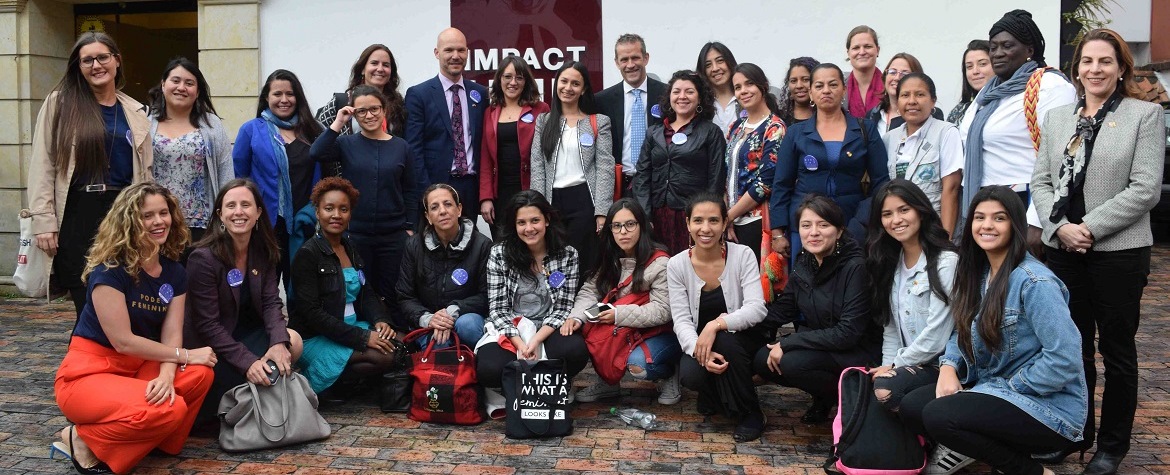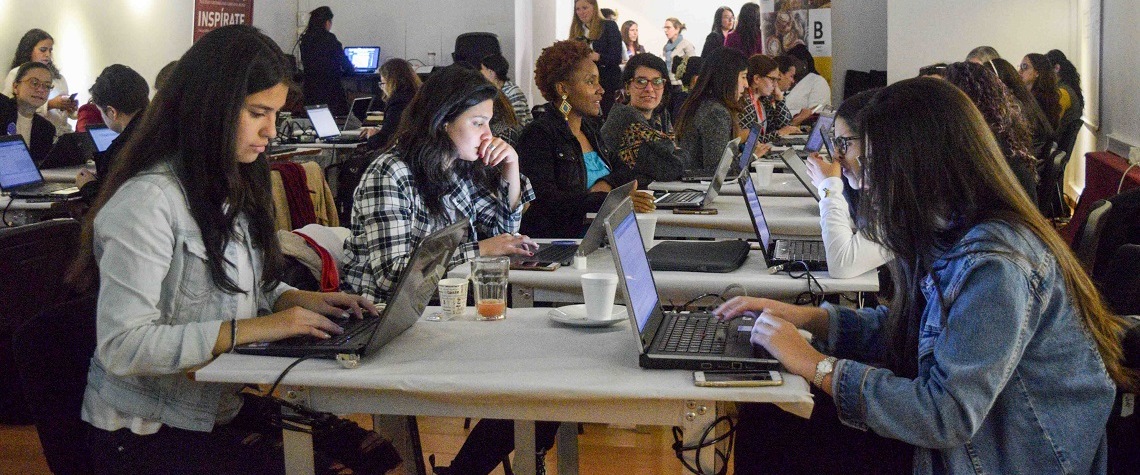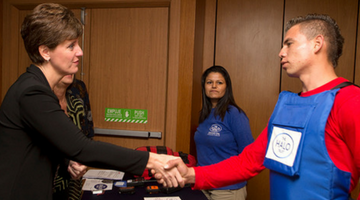Women activists fight to bridge the WikiGap
Canada in Colombia and Czech Republic
Women’s Empowerment
June 2018
Editors create Wikipedia profiles about Colombian women in Bogotá, Colombia on International Women’s Day.
Follow:
Of nearly six million English articles on Wikipedia, fewer than 20% of profiles are about women. Thousands of volunteers edit and write pages for the free online encyclopedia, yet women only make up 10% of those contributors.
On International Women’s Day, Canadian missions worked to change that.
In an initiative started by the Swedish Ministry of Foreign Affairs, the WikiGap campaign helps raise awareness of Wikipedia’s gender gap and increase representation of women on the platform.
Partnering with the non-profit Wikimedia Foundation, Canadian Embassies in Colombia and Czech Republic, as well as the Canadian Permanent Mission to UNESCO and the Canadian Commission for UNESCO, added content to Wikipedia, making visible their achievements in social, economic and political spheres.
The brave work of Colombian women
In Bogotá, Colombia, 25 editors wrote about Colombian women and girls who have worked to build peace and equality. Women play a key role in the country’s path to peace, although many have been targeted for their work supporting victims of the armed conflict and fighting for human rights. Colombia’s Ombudsperson’s Office reports that 40 Colombian female activists have been killed since 2016.

“With initiatives like the #Wikigap, we reaffirm Canada's commitment to women’s and girls’ rights in Colombia, and we celebrate its fundamental role as agents of change.” – Marcel Lebleu, Ambassador of Canada to Colombia
Valentina Quintero, a university student in Bogotá, said she wanted her WikiGap contributions to “produce information about those Colombian female leaders who have not been recognized on the Internet or in books.”
After an afternoon of work, the team added 30 new profiles about Colombian women.
In Paris, supporting women in STEM
Nearly 10,000 kilometres away, on the other side of the Atlantic, over 250 people gathered at the UNESCO headquarters in Paris to bridge the “WikiGap.” By the end of International Women’s Day, the group wrote 119 new biographies, edited nearly 200 articles and added over 400,000 words about women to Wikipedia.
Elaine Ayotte, Canada’s Ambassador and Permanent Delegate to UNESCO, chose to shine a spotlight on fields where women are consistently underrepresented: Science, Technology, Engineering and Mathematics (STEM).
Ambassador Ayotte contributed a profile of Dr. Lorina Naci (available in French only), a Canadian neuroscientist whose many research areas include human consciousness, brain injuries and Alzheimer’s disease and who was identified as an “International Rising Talent” by the L’Oréal-UNESCO for Women in Science program in 2017.
Dr. Naci, an Assistant Professor of Psychology at Trinity College Dublin, is an outspoken advocate for women in STEM and encourages equal access to the fields for both men and women.

From left to right: The Swedish Ambassador to UNESCO, Annika Markovic, the UNESCO Director-General, Audrey Azoulay and Canadian Ambassador Elaine Ayotte join hundreds of participants at UNESCO headquarters in Paris.
Celebrating Czech women who shaped the past

Participants collaborate on 18 new Wikipedia articles about influential Czech women.
While participants in Paris wrote about women who are shaping the future, the Embassy of Canada to Czech Republic reflected on the role of women in history.
A recent Historica Canada survey found that four out of ten Canadians could not name the accomplishments of famous Canadian women. Ambassador Barbara Richardson highlighted this survey to demonstrate the lack of awareness of women’s contributions, and the room for growth in Canada and around the world.
Partnering with the United States and Swedish embassies in Prague, participants made sure that inspirational women in Czech Republic would be properly recognized.
Eighteen new articles told the stories of accomplished women like Olga Fierzová (available in Polish only), a social worker who fought to protect Jewish children in the Second World War and Pavla Tichá (available in Polish only), who pioneered mental health support for cancer patients and their relatives.
Closing the gender gap
In the span of a few hours on International Women’s Day, Canadian offices helped create nearly 200 new Wikipedia page sharing previously untold stories of brave, bold and intelligent women from around the world.
Canadian offices look forward to making this project an annual tradition, creating a space in the digital history books for women of the past and the future.
Related links
External resources
- WikiGap
- Lotta Hitschmanova
- Yolanda Becerra (available in Spanish only)
- Colombia Should Celebrate its Women Activists
- Four in Ten Canadians Unfamiliar with Historic Achievements of Many of Canada’s Most Notable Women
- 40 women social leaders have been murdered in the country since 2016: Ombudsman (available in Spanish only)
- Date modified:



